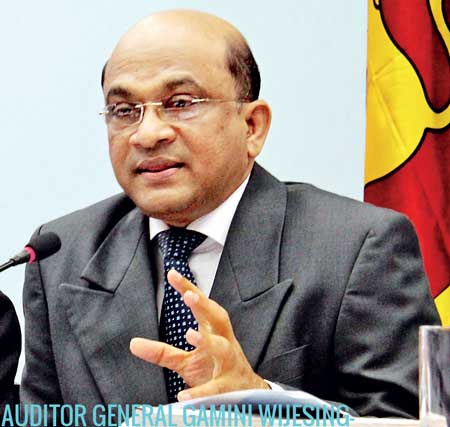Thursday Feb 19, 2026
Thursday Feb 19, 2026
Saturday, 19 August 2017 00:43 - - {{hitsCtrl.values.hits}}
 By Chathuri Dissanayake
By Chathuri Dissanayake
As the proposed Audit Bll continues to shuttle between offices for repeated amendments, Auditor General Gamini Wijesinghe yesterday complained his department is unable to function at full capacity without the legislation being passed by Parliament.
“We are here nor there. The 19th Amendment made the older legislations redundant. We cannot move forward as the new act has yet to be passed. We are in a very difficult situation now,” Wijesisghe told reporters at a press conference in Colombo yesterday.
Following to the 19th Amendment to the Constitution which established the Audit Commission, the Audit Act was to be passed in Parliament to provide subsequent provisions for the Department to operate. However, as the proposed Bill has yet to be passed, the Auditor General Department is unable to carry out its functions effectively.
“We could have worked under the previous law, but the 19th Amendment has changed the law. This has left us immobile and we are unable to carry out our functions in the current state, as we have no legislation on the Audit department,” Wijesisghe said.
Although the Commission has been appointed, provisions to hold meetings and carry out its functions are to be outlined in the proposed Act, he said.
He added that his Department is unable to fill existing vacancies, give promotions or increments to existing staff without the legislation.
At present, only one Deputy Auditor General is working, where there should be a total of 15 officers.
“One officer has been forced to carry out the work of 14 more officers,” Wijesinghe said, giving examples of constraints the Department is faced with in the absence of the legislation.
Stressing on the need of a strong and independent audit arm for the state service, the Auditor General said that the establishment of the legislation is needed to reintroduce good governance practices to the state service.
“The new mechanism should be in place to bring back good governance practices to the state, and this is the way forward. If there is a doubt we can test the mechanism, and if it is not acceptable, we can remove problematic elements later,” he said, adding that provisions are available for amendment.
Wijesinghe also said that much of the corruption that took place during the recent past could have been avoided, had the bill which was first drafted in 2003, during UNP-led Government had been passed. According to former Auditor General Sarath Mayadunne, the main architect of the original draft in 2003, although cabinet agreed on the draft in principle, the bill was shelved.
The draft was only discussed again in 2015, following 19th Amendment to the Constitution, Wijesinghe said. Since then the Bill has already gone through 22 amendments and has yet to be approved by the Cabinet and tabled in Parliament.
There were a lot of amendments that diluted the powers of the Auditor General and the independence of the office; however, these have been rectified now, Wijesinghe assured.
“This was drafted by a committee which had international exposure on Audit matters, but then individuals who had no training in Audit who didn’t even have an understanding in basic concepts started amending it, that is why it got diluted. There were a lot of contradictions, even conflicting with the constitution. But now we have been able to fix it,” he said.
The main reason for the opposition for the Act comes due to a provision which gives the Auditor General power to issue surcharge certificates to recover losses to the state due to malpractices or illegal actions of government officials.
In a last ditch effort get the long delayed Audit bill passed through Parliament he appealed to the legislators to move with the draft without the clause which has raised fears.
Mayadunne too appealed to Members of the Parliament to present the bill as a private bill, to surpass the deadlock in the Government.